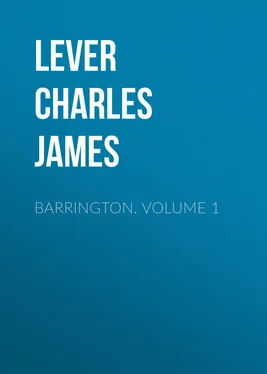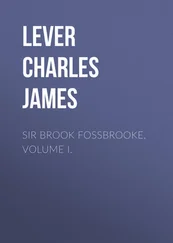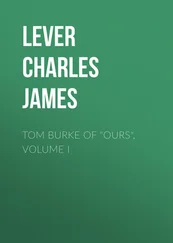Charles Lever - Barrington. Volume 1
Здесь есть возможность читать онлайн «Charles Lever - Barrington. Volume 1» — ознакомительный отрывок электронной книги совершенно бесплатно, а после прочтения отрывка купить полную версию. В некоторых случаях можно слушать аудио, скачать через торрент в формате fb2 и присутствует краткое содержание. Жанр: literature_19, foreign_antique, foreign_prose, на английском языке. Описание произведения, (предисловие) а так же отзывы посетителей доступны на портале библиотеки ЛибКат.
- Название:Barrington. Volume 1
- Автор:
- Жанр:
- Год:неизвестен
- ISBN:нет данных
- Рейтинг книги:5 / 5. Голосов: 1
-
Избранное:Добавить в избранное
- Отзывы:
-
Ваша оценка:
- 100
- 1
- 2
- 3
- 4
- 5
Barrington. Volume 1: краткое содержание, описание и аннотация
Предлагаем к чтению аннотацию, описание, краткое содержание или предисловие (зависит от того, что написал сам автор книги «Barrington. Volume 1»). Если вы не нашли необходимую информацию о книге — напишите в комментариях, мы постараемся отыскать её.
Barrington. Volume 1 — читать онлайн ознакомительный отрывок
Ниже представлен текст книги, разбитый по страницам. Система сохранения места последней прочитанной страницы, позволяет с удобством читать онлайн бесплатно книгу «Barrington. Volume 1», без необходимости каждый раз заново искать на чём Вы остановились. Поставьте закладку, и сможете в любой момент перейти на страницу, на которой закончили чтение.
Интервал:
Закладка:
“You won’t believe me, Miss Dinah, but, as I sit here, the peaches was like little melons, and the cherries as big as walnuts.”
“They made cherry-bounce out of them, I hope, sir,” said she, with a scornful smile.
“No, indeed, ma’am,” replied he, dull to the sarcasm; “they ate them in a kind of sauce with roast-pig, and mighty good too!”
But enough of the Major; and now a word, and only a word, for his companion, already alluded to by Barrington.
Dr. Dill had been a poor “Dispensary Doctor” for some thirty years, with a small practice, and two or three grand patrons at some miles off, who employed him for the servants, or for the children in “mild cases,” and who even extended to him a sort of contemptuous courtesy that serves to make a proud man a bear, and an humble man a sycophant.
Dill was the reverse of proud, and took to the other line with much kindliness. To have watched him in his daily round you would have said that he liked being trampled on, and actually enjoyed being crushed. He smiled so blandly, and looked so sweetly under it all, as though it was a kind of moral shampooing, from which he would come out all the fresher and more vigorous.
The world is certainly generous in its dealings with these temperaments; it indulges them to the top of their hearts, and gives them humiliations to their heart’s content. Rumor – the same wicked goddess who libelled Miss Barrington – hinted that the doctor was not, within his own walls and under his own roof, the suffering angel the world saw him, and that he occasionally did a little trampling there on his own account. However, Mrs. Dill never complained; and though the children wore a tremulous terror and submissiveness in their looks, they were only suitable family traits, which all redounded to their credit, and made them “so like the doctor.”
Such were the two worthies who slowly floated along on the current of the river of a calm summer’s evening, to visit the Barringtons. As usual, the talk was of their host. They discussed his character and his habits and his debts, and the difficulty he had in raising that little loan; and in close juxtaposition with this fact, as though pinned on the back of it, his sister’s overweening pride and pretension. It had been the Major’s threat for years that he ‘d “take her down a peg one of these days.” But either he was mercifully unwilling to perform the act, or that the suitable hour for it had not come; but there she remained, and there he left her, not taken down one inch, but loftier and haughtier than ever. As the boat rounded the point from which the cottage was visible through the trees and some of the outhouses could be descried, they reverted to the ruinous state everything was falling into. “Straw is cheap enough, anyhow,” said the Major. “He might put a new thatch on that cow-house, and I ‘m sure a brush of paint would n’t ruin any one.” Oh, my dear reader! have you not often heard – I know that I have – such comments as these, such reflections on the indolence or indifference which only needed so very little to reform, done, too, without trouble or difficulty, habits that could be corrected, evil ways reformed, and ruinous tendencies arrested, all as it were by a “rush of paint,” or something just as uncostly?
“There does n’t seem to be much doing here, Dill,” said M’Cormick, as they landed. “All the boats are drawn up ashore. And faith! I don’t wonder, that old woman is enough to frighten the fish out of the river.”
“Strangers do not always like that sort of thing,” modestly remarked the doctor, – the “always” being peculiarly marked for emphasis. “Some will say, an inn should be an inn.”
“That’s my view of it. What I say is this: I want my bit of fish, and my beefsteak, and my pint of wine, and I don’t want to know that the landlord’s grandfather entertained the king, or that his aunt was a lady-in-waiting. ‘Be’ as high as you like,’ says I, ‘but don’t make the bill so,’ – eh, Dill?” And he cackled the harsh ungenial laugh which seems the birthright of all sorry jesters; and the doctor gave a little laugh too, more from habit, however, than enjoyment.
“Do you know, Dill,” said the Major, disengaging himself from the arm which his lameness compelled him to lean on, and standing still in the pathway, – “do you know that I never reach thus far without having a sort of struggle with myself whether I won’t turn back and go home again. Can you explain that, now?”
“It is the wound, perhaps, pains you, coming up the hill.”
“It is not the wound. It’s that woman!”
“Miss Barrington?”
“Just so. I have her before me now, sitting up behind the urn there, and saying, ‘Have you had tea, Major M’Cormick?’ when she knows well she did n’t give it to me. Don’t you feel that going up to the table for your cup is for all the world like doing homage?”
“Her manners are cold, – certainly cold.”
“I wish they were. It’s the fire that’s in her I ‘m afraid of! She has as wicked an eye in her head as ever I saw.”
“She was greatly admired once, I ‘m told; and she has many remains of beauty.”
“Oh! for the matter of looks, there’s worse. It’s her nature, her temper, – herself, in fact, I can’t endure.”
“What is it you can’t endure, M’Cormick?” cried Barrington, emerging from a side walk where he had just caught the last words. “If it be anything in this poor place of mine, let me hear, that I may have it amended.”
“How are ye, – how are ye?” said the Major, with a very confused manner. “I was talking politics with Dill. I was telling him how I hated them Tories.”
“I believe they are all pretty much alike,” said Barring-ton; “at least, I knew they were in my day. And though we used to abuse him, and drink all kind of misfortunes to him every day of our lives, there was n’t a truer gentleman nor a finer fellow in Ireland than Lord Castlereagh.”
“I’m sure of it. I’ve often heard the same remark,” chimed in Dill.
“It’s a pity you didn’t think so at the time of the Union,” said M’Cormick, with a sneer.
“Many of us did; but it would not make us sell our country. But what need is there of going back to those times, and things that can’t be helped now? Come in and have a cup of tea. I see my sister is waiting for us.”
Why was it that Miss Barrington, on that evening, was grander and statelier than ever? Was it some anticipation of the meditated change in their station had impressed her manner with more of pride? I know not; but true it is she received her visitors with a reserve that was actually chilling. To no end did Barrington exert himself to conceal or counteract this frigidity. In all our moral chemistry we have never yet hit upon an antidote to a chilling reception.
The doctor was used to this freezing process, and did not suffer like his companion. To him, life was a huge ice-pail; but he defied frost-bite, and bore it. The Major, however chafed and fidgeted under the treatment, and muttered to himself very vengeful sentiments about that peg he had determined to take her down from.
“I was hoping to be able to offer you a nosegay, dear lady,” said Dill, – this was his customary mode of address to her, an ingenious blending of affection with deference, but in which the stronger accent on the last word showed the deference to predominate, – “but the rain has come so late, there’s not a stock in the garden fit to present to you.”
“It is just as well, sir. I detest gillyflowers.”
The Major’s eyes sparkled with a spiteful delight, for he was sorely jealous of the doctor’s ease under difficulties.
“We have, indeed, a few moss-roses.”
Читать дальшеИнтервал:
Закладка:
Похожие книги на «Barrington. Volume 1»
Представляем Вашему вниманию похожие книги на «Barrington. Volume 1» списком для выбора. Мы отобрали схожую по названию и смыслу литературу в надежде предоставить читателям больше вариантов отыскать новые, интересные, ещё непрочитанные произведения.
Обсуждение, отзывы о книге «Barrington. Volume 1» и просто собственные мнения читателей. Оставьте ваши комментарии, напишите, что Вы думаете о произведении, его смысле или главных героях. Укажите что конкретно понравилось, а что нет, и почему Вы так считаете.












